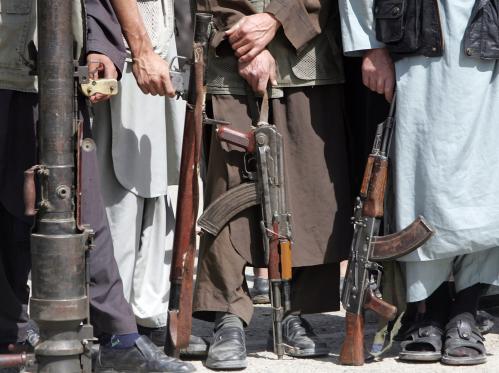One week ago, a senior Pentagon official went before the Senate Armed Services Committee, along with the Pentagon’s top lawyers, and declared that the armed conflict with Al Qaeda and its associated forces under the Authorization for Use of Military Force (AUMF) would go on for another decade or two. He declared that the conflict geographically followed the enemy worldwide. The witnesses described the AUMF as giving the Pentagon adequate authority to target members of Al Qaeda and its associated forces.
If there was a unifying theme of President Obama’s speech today at the National Defense University, it was an effort to align himself as publicly as possible with the critics of the positions his administration is taking without undermining his administration’s operational flexibility in actual fact. To put it crassly, the president sought to rebuke his own administration for taking the positions it has—but also to make sure that it could continue to do so.
A great deal of the President’s speech was noise—noise in the form of broad, overarching accounts of his strategic vision, noise in the form of continuous veiled (or not-so-veiled) criticisms of his predecessor’s strategic vision and fidelity to American values, and noise in the form of apparent changes in policy that in actual fact change very little. But there are also a few important announcements contained in the speech. Over the next few posts, I will offer some initial thoughts, focused on trying to identify those aspects of the speech that seem to me either more than verbiage or as notable because they in fact reflect less than meets the eye.
The overarching theme of the speech definitely falls into the latter category. The President presents himself throughout the speech as bringing this war to a close: “[O]ur commitment to Constitutional principles has weathered every war, and every war has come to an end,” he said at the outset. And then, later on, he declares:
All these issues remind us that the choices we make about war can impact—in sometimes unintended ways—the openness and freedom on which our way of life depends. And that is why I intend to engage Congress about the existing Authorization to Use Military Force, or AUMF, to determine how we can continue to fight terrorists without keeping America on a perpetual war-time footing.
The AUMF is now nearly twelve years old. The Afghan War is coming to an end. Core al Qaeda is a shell of its former self. Groups like AQAP must be dealt with, but in the years to come, not every collection of thugs that labels themselves al Qaeda will pose a credible threat to the United States. Unless we discipline our thinking and our actions, we may be drawn into more wars we don’t need to fight, or continue to grant Presidents unbound powers more suited for traditional armed conflicts between nation states. So I look forward to engaging Congress and the American people in efforts to refine, and ultimately repeal, the AUMF’s mandate. And I will not sign laws designed to expand this mandate further. Our systematic effort to dismantle terrorist organizations must continue. But this war, like all wars, must end. That’s what history advises. That’s what our democracy demands.
In other words, while the Pentagon regards the AUMF as providing the authority it needs to confront the enemy for the next two decades, the president wants to work with Congress to get off the war footing and to secure the document’s narrowing, and ultimate repeal. It’s a striking contrast, whomever one thinks is right.
A striking contrast, that is, unless one does not quite take Obama at face value on this. After all, Obama does not need Congress to narrow or repeal the AUMF or to get off of a war footing. He can do it himself, declaring hostilities over in whole or in part. And Obama, needless to say, did not do anything like that. To the contrary, he promised that “we must finish the work of defeating al Qaeda and its associated forces” and while he used a lot of nice words about law enforcement and a lot of disparaging words about perpetual states of war, he also promised to continue targeting the enemy with lethal force under the AUMF. In other words, he promised—without quite saying it directly—to keep waging war:
Moreover, America’s actions are legal. We were attacked on 9/11. Within a week, Congress overwhelmingly authorized the use of force. Under domestic law, and international law, the United States is at war with al Qaeda, the Taliban, and their associated forces. We are at war with an organization that right now would kill as many Americans as they could if we did not stop them first. So this is a just war—a war waged proportionally, in last resort, and in self-defense.
So count me a little confused: Are we heading for ten or twenty more years of war under the AUMF or are we on the road to peace and the primacy of peace-time authorities? Or are we, as I suspect, on a road to more use of peacetime authorities and less war under the AUMF, a different vocabulary for conflict, but ultimately long-term use of substantially the same authorities we have been using?


Commentary
Op-edThe President’s National Security Speech: A Quick and Dirty Reaction – Part 1
May 23, 2013